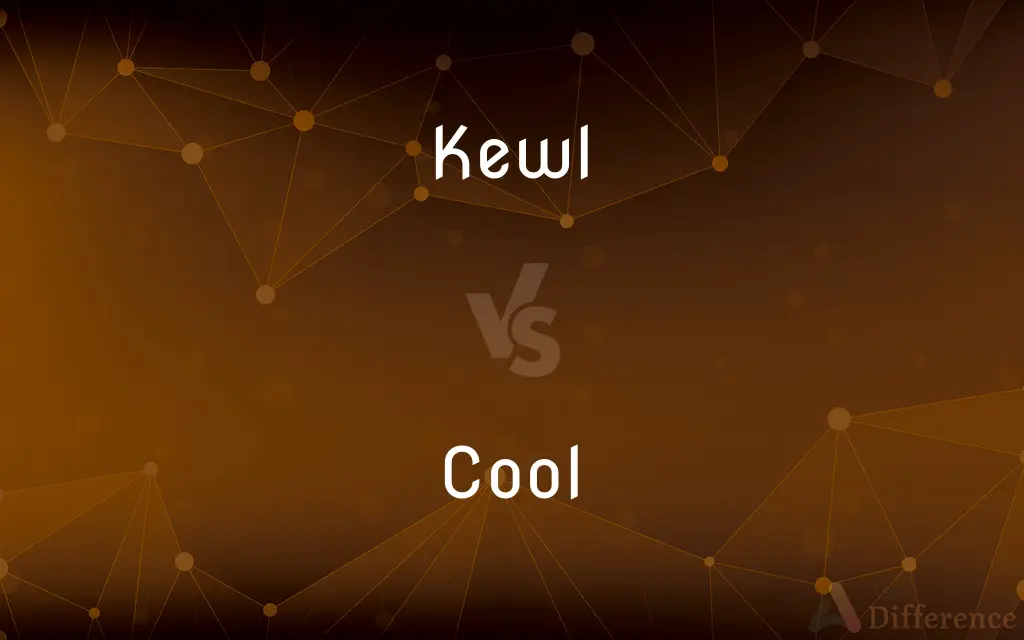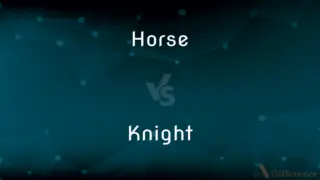Kewl vs. Cool — What's the Difference?
By Fiza Rafique & Urooj Arif — Updated on April 3, 2024
"Kewl" is an informal, stylized spelling of "cool," used to convey a playful or trendy attitude, while "cool" is a widely accepted term denoting approval or admiration.

Difference Between Kewl and Cool
Table of Contents
ADVERTISEMENT
Key Differences
"Kewl" represents a playful or non-conventional approach to language, often used in digital communication to convey approval or enthusiasm in a more informal or trendy manner. On the other hand, "cool" is a traditional adjective used across various contexts to express a positive sentiment, ranging from approval and admiration to a state of calmness or a lack of warmth.
The use of "kewl" is more common among younger generations or within specific online communities, reflecting a desire to stand out or to align with particular subcultures. In contrast, "cool" is universally recognized and used by people of all ages, maintaining its place in both casual and formal discourse without confusion.
"Kewl" often carries a tone of irony or sarcasm, used in situations where the speaker wants to emphasize their point with a sense of humor or light-heartedness. "Cool," however, can be used straightforwardly without necessarily implying any additional layers of meaning, making it versatile in its applicability.
In digital communication, "kewl" can signify the sender's familiarity with internet slang and digital culture, indicating a relaxed communication style. Conversely, "cool" is perceived as more neutral, suitable for a wide range of digital and face-to-face conversations, embodying a classic choice that transcends specific cultural trends.
Despite their differences, both "kewl" and "cool" serve to express a positive reaction or sentiment. The choice between them can signal the speaker's identity, their relationship with the audience, and the context of the communication, ranging from playful or casual to more conventional or respectful.
ADVERTISEMENT
Comparison Chart
Formality
Informal, trendy.
Neutral, widely accepted.
Usage Context
Digital communication, youth.
Universal, across all age groups.
Tone
Playful, ironic.
Straightforward, versatile.
Cultural Significance
Aligns with internet slang.
Transcends specific cultural trends.
Communication Style
Reflects familiarity with digital culture.
Suitable for a wide range of conversations.
Compare with Definitions
Kewl
Often carries a tone of irony or sarcasm.
Oh, you got another parking ticket? Kewl.
Cool
An expression of approval or admiration.
That's a cool idea for our project.
Kewl
Reflects a non-conventional approach to language.
I'll meet you at 8, kewl?
Cool
Used to describe a lack of warmth.
The weather is cool for this time of year.
Kewl
Signifies the speaker's alignment with digital or youth cultures.
Your new skateboard is so kewl.
Cool
Widely recognized and used across contexts.
It's cool that you're learning to play the guitar.
Kewl
An informal spelling of cool, indicating trendiness.
That new game looks kewl.
Cool
Describes something as fashionable or attractive.
He's got a cool new jacket.
Kewl
Used in digital communications for a playful tone.
Saw your post, kewl pics!
Cool
Indicates a state of calmness.
She remained cool under pressure.
Kewl
(Internet slang) cool
Cool
Neither warm nor very cold; moderately cold
Fresh, cool water.
A cool autumn evening.
Cool
Giving or suggesting relief from heat
A cool breeze.
A cool blouse.
Cool
Marked by calm self-control
A cool negotiator.
Cool
Marked by indifference, disdain, or dislike; unfriendly or unresponsive
A cool greeting.
Was cool to the idea of higher taxes.
Cool
Of, relating to, or characteristic of colors, such as blue and green, that produce the impression of coolness.
Cool
Knowledgeable or aware of the latest trends or developments
Spent all his time trying to be cool.
Cool
Excellent; first-rate
Has a cool sports car.
Had a cool time at the party.
Cool
Acceptable; satisfactory
It's cool if you don't want to talk about it.
Cool
(Slang) Entire; full
Worth a cool million.
Cool
(Informal) In a casual manner; nonchalantly
Play it cool.
Cool
To make less warm.
Cool
To make less ardent, intense, or zealous
Problems that soon cooled my enthusiasm for the project.
Cool
(Physics) To reduce the molecular or kinetic energy of (an object).
Cool
To become less warm
Took a dip to cool off.
Cool
To become calmer
Needed time for tempers to cool.
Cool
A cool place, part, or time
The cool of early morning.
Cool
The state or quality of being cool.
Cool
Composure; poise
"Our release marked a victory. The nation had kept its cool" (Moorhead Kennedy).
Cool
Having a slightly low temperature; mildly or pleasantly cold.
Cool
Allowing or suggesting heat relief.
Linen has made cool and breathable clothing for millennia.
Cool
Of a color, in the range of violet to green.
If you have a reddish complexion, you should mainly wear cool colors.
Cool
Of a person, not showing emotion; calm and in control of oneself.
Cool
Unenthusiastic, lukewarm, skeptical.
His proposals had a cool reception.
Cool
Calmly audacious.
In control as always, he came up with a cool plan.
Cool
Applied facetiously to a sum of money, commonly as if to give emphasis to the largeness of the amount.
Cool
(informal) Of a person, knowing what to do and how to behave; considered popular by others.
Cool
(informal) In fashion and fancy, part of or befitting the most leading trends and habits of the in crowd; originally hipster slang.
Cool
(informal) Of an action, all right; acceptable; that does not present a problem.
Is it cool if I sleep here tonight?
Cool
(informal) Very interesting or exciting.
I think astronomy is really cool.
Cool
(informal) (followed by with) Able to tolerate; to be fine with.
I'm completely cool with my girlfriend leaving me.
Cool
(informal) (of a pair of people) holding no grudge against one another; having no beef.
We're cool, right?
Cool
(sarcastic) (of an act or situation)'' annoying, irritating.
Cool
A moderate or refreshing state of cold; moderate temperature of the air between hot and cold; coolness.
In the cool of the morning
Cool
A calm temperament.
Cool
The property of being cool, popular or in fashion.
Cool
To lose heat, to get colder.
I like to let my tea cool before drinking it so I don't burn my tongue.
Cool
To make cooler, less warm.
Cool
To become less intense, e.g. less amicable or passionate.
Relations cooled between the USA and the USSR after 1980.
Cool
To make less intense, e.g. less amicable or passionate.
Cool
(transitive) To kill.
Cool
Moderately cold; between warm and cold; lacking in warmth; producing or promoting coolness.
Fanned with cool winds.
Cool
Not ardent, warm, fond, or passionate; not hasty; deliberate; exercising self-control; self-possessed; dispassionate; indifferent; as, a cool lover; a cool debater.
For a patriot, too cool.
Cool
Not retaining heat; light; as, a cool dress.
Cool
Manifesting coldness or dislike; chilling; apathetic; as, a cool manner.
Cool
Quietly impudent; negligent of propriety in matters of minor importance, either ignorantly or willfully; presuming and selfish; audacious; as, cool behavior.
Its cool stare of familiarity was intolerable.
Cool
Applied facetiously, in a vague sense, to a sum of money, commonly as if to give emphasis to the largeness of the amount.
He had lost a cool hundred.
Leaving a cool thousand to Mr. Matthew Pocket.
Cool
A moderate state of cold; coolness; - said of the temperature of the air between hot and cold; as, the cool of the day; the cool of the morning or evening.
Cool
To make cool or cold; to reduce the temperature of; as, ice cools water.
Send Lazarus, that he may dip the tip of his finger in water, and cool my tongue.
Cool
To moderate the heat or excitement of; to allay, as passion of any kind; to calm; to moderate.
We have reason to cool our raging motions, our carnal stings, our unbitted lusts.
Cool
To become less hot; to lose heat.
I saw a smith stand with his hammer, thus,the whilst his iron did on the anvil cool.
Cool
To lose the heat of excitement or passion; to become more moderate.
I will not give myself liberty to think, lest I should cool.
Cool
The quality of being cool;
The cool of early morning
Cool
Great coolness and composure under strain;
Keep your cool
Cool
Make cool or cooler;
Chill the food
Cool
Loose heat;
The air cooled considerably after the thunderstorm
Cool
Lose intensity;
His enthusiasm cooled considerably
Cool
Neither warm or very cold; giving relief from heat;
A cool autumn day
A cool room
Cool summer dresses
Cool drinks
A cool breeze
Cool
Marked by calm self-control (especially in trying circumstances); unemotional;
Play it cool
Keep cool
Stayed coolheaded in the crisis
The most nerveless winner in the history of the tournament
Cool
(color) inducing the impression of coolness; used especially of greens and blues and violets;
Cool greens and blues and violets
Cool
Psychologically cool and unenthusiastic; unfriendly or unresponsive or showing dislike;
Relations were cool and polite
A cool reception
Cool to the idea of higher taxes
Cool
Used of a number or sum and meaning without exaggeration or qualification;
A cool million bucks
Cool
Fashionable and attractive at the time; often skilled or socially adept;
He's a cool dude
That's cool
Mary's dress is really cool
It's not cool to arrive at a party too early
Common Curiosities
Is it appropriate to use kewl in professional settings?
It's generally not appropriate to use kewl in professional settings due to its informal nature and association with digital slang.
Why do people use kewl instead of cool?
People may use kewl to convey a sense of trendiness, to align with digital or youth cultures, or to add a playful tone to their message.
Can kewl and cool be used interchangeably?
They can be used interchangeably in terms of meaning, but the choice between them can affect the tone and perceived formality of the communication.
How did kewl become popular?
Kewl became popular through internet culture and digital communication, where playful spellings and expressions often gain traction.
Is kewl a real word?
While not traditionally recognized in formal English, kewl is a real word within the context of informal digital communication and youth slang.
Can cool have negative connotations?
While typically positive, cool can have negative connotations, such as emotional detachment or indifference, depending on the context.
What does kewl mean?
Kewl is a playful, informal spelling of cool, often used to convey trendiness or approval in a light-hearted manner.
Does the use of kewl vary by age group?
Yes, the use of kewl is more common among younger generations and is less likely to be used by older individuals.
Can the use of cool ever be considered outdated?
While specific uses of cool may vary in popularity, the word itself has remained widely accepted and adaptable, unlikely to be considered outdated.
Do kewl and cool have the same origin?
Yes, kewl is derived from cool, adopting a stylized spelling to convey similar meanings in a more informal or playful manner.
Is using kewl considered slang?
Yes, kewl is considered a form of slang, especially within the context of internet or youth culture.
Are there cultural differences in the use of kewl and cool?
Yes, cultural differences can affect the perception and usage of kewl and cool, with certain cultures or communities preferring one over the other based on norms or trends.
How should one decide whether to use kewl or cool?
Consider your audience, the formality of the setting, and your desired tone when deciding between kewl and cool, opting for cool in more neutral or formal contexts.
How does the context affect the choice between kewl and cool?
The context, including the audience, setting, and communication medium, significantly influences whether kewl or cool is more appropriate.
Share Your Discovery

Previous Comparison
Aliteracy vs. Illiteracy
Next Comparison
Horse vs. KnightAuthor Spotlight
Written by
Fiza RafiqueFiza Rafique is a skilled content writer at AskDifference.com, where she meticulously refines and enhances written pieces. Drawing from her vast editorial expertise, Fiza ensures clarity, accuracy, and precision in every article. Passionate about language, she continually seeks to elevate the quality of content for readers worldwide.
Co-written by
Urooj ArifUrooj is a skilled content writer at Ask Difference, known for her exceptional ability to simplify complex topics into engaging and informative content. With a passion for research and a flair for clear, concise writing, she consistently delivers articles that resonate with our diverse audience.
















































